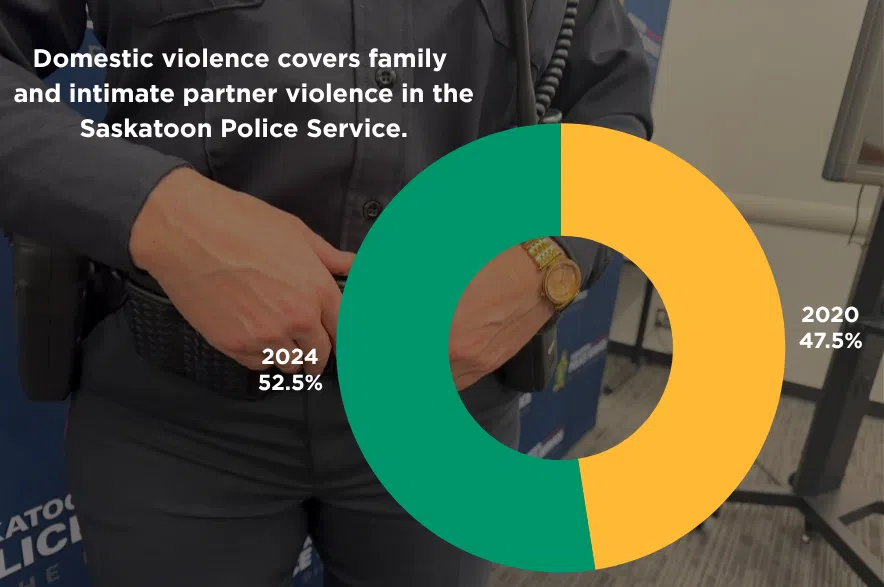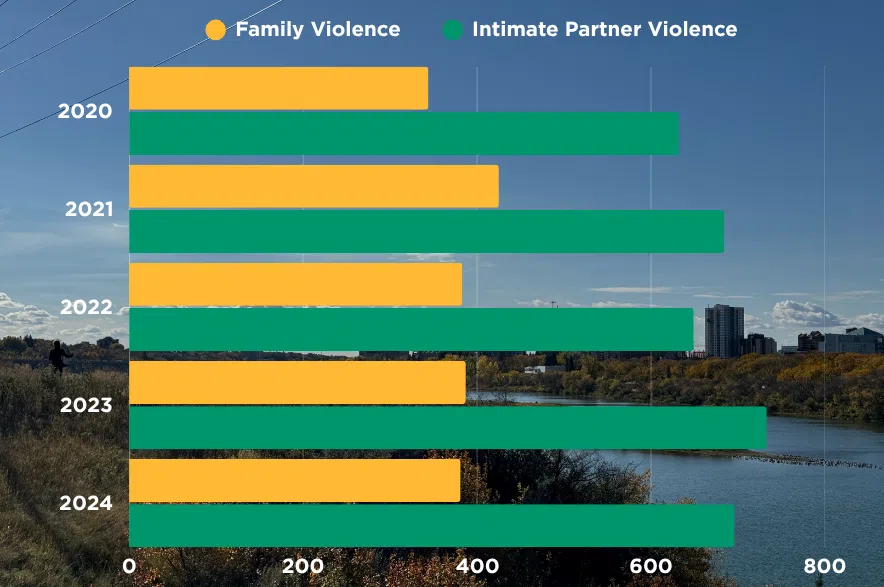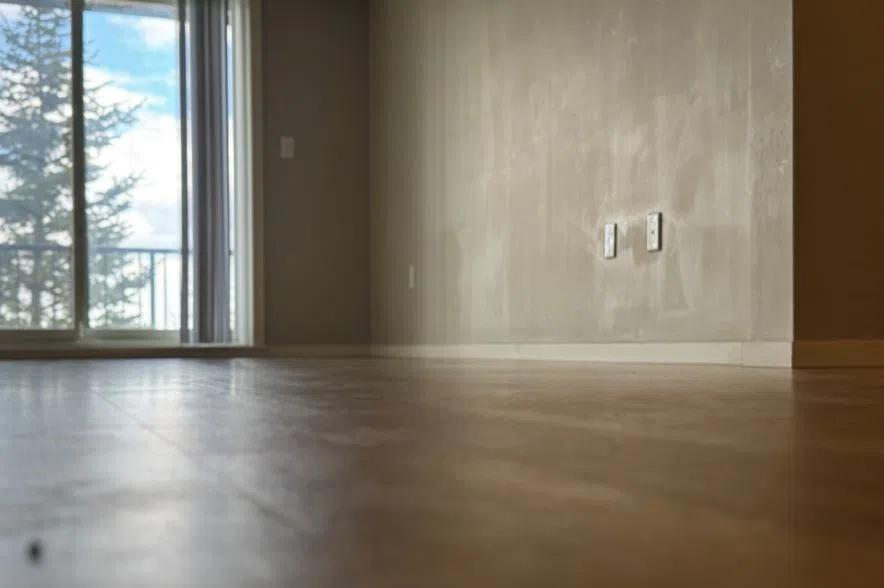In Saskatchewan, there is a growing trend of intimate partner violence (IPV).
In 2024 the province released startling numbers showing that in 2023 more than half of the violent crimes dealt with by RCMP jurisdiction were related to offences against intimate partners or family members.
Now the Saskatoon Police Service (SPS) is responding.
Intimate partner violence can be physical, sexual, emotional, spiritual, neglect or financial, among other things, and is a pattern of abuse where one partner controls the other through force, intimidation or threats.
“The Saskatoon Police Service is going to take a stand and we’re going to stand with the victims, and we’re going to do what we can to make the process better and remove some of those barriers for victims to come forward,” said Richard Bueckert, an inspector in investigative services for the SPS.
SPS has an Intimate Partner Violence Response Team made up of one officer and one counsellor, and both work with Family Service Saskatoon. SPS said IPV calls are among the highest they receive.
“We’re more of like an urgent response, like immediate response team, and then that follow up withina three to six month window to prevent re-victimization or to try to reduce revictimization,” Intimate Partner Violence Response Team Constable Brooke Anderson said.
There were 696 IPV cases in 2024, according to Saskatoon police.

Domestic violence is a broad term that covers family and interpersonal violence in the Saskatoon Police Service. (Photo and graphic by Céline Grimard/650 CKOM)
“We’re more here for anyone really high-risk or any sort of immediate follow-up that needs to happen … but also to ensure 100 per cent compliance with court conditions for offenders as well,” said Anderson.
IPVRT progress includes charges, condition checks
Since February, the team has:
- Handled 119 referrals to the program.
- Laid four charges “that wouldn’t have been laid otherwise,” according to police.
- Undertaken 30 condition checks.
- Assisted with transporting a victim and their family to police for a statement.
- Interviewed more than 12 accused.
Anderson said her partner from Family Service Saskatoon has received feedback over the years from victims being re-victimized.
Anderson’s partner, a domestic violence court caseworker, has had victims express
“It’s hard for victims to call police … but if we do a follow-up just to check in with that victim and the offender is there, then we can breach them right away, and then it’s that that burden is removed from the victim actually reporting that breach.”
Why was the IPV team created?
“When I originally had come up with the vision of having this team in 2023, 30 per cent of our homicides were IPV related. Already in 2025, we have one. So it’s just one is too many,” said Bueckert.
“We’ve had enough examples over the years of the impacts of intimate partner violence, and then what happens if it goes unreported or unspoken, it progresses to the worst end — and that’s a homicide,” he said.
“That’s why we created this team.”
The growing trend in Saskatoon has been on the rise for all of Saskatchewan, with RCMP reporting a 13 per cent increase over the past five years.
In 2023, more than half of the violent crimes dealt with by the RCMP jurisdiction were related to offences against intimate partners or family members.

(Photo and graphic by Céline Grimard/650 CKOM)
“When viewing the data it was just obvious that a different approach was necessary in our city, and we have staff here that are willing to try new things,” said Bueckert.
SPS already has three sergeants for their domestic violence unit.
“We’re going to be able to provide a better service and a new approach to dealing with a problem. The numbers are just way too high,” said Bueckert.
Four children were among the 34 people who were killed last year in the province due to domestic violence. Eighty-two per cent of perpetrators were men, while 83 per cent of victims were women.
How does the SPS team help?
“Letting them know that they’re not doing this alone, and that our team can assist them through the process,” said Bueckert.
For the victims the team can provide information about court process and expectations of what they can and can’t expect, help with connection to financial support and counselling for themselves and children.
For the offender, Bueckert said the team can connect them to “services and resources that can help like anger management and changing their behaviour and understanding that IPV is not acceptable in this province, or anywhere.”
In February, the province announced $3.8 million in funding to organizations to help address IPV. The money is earmarked for prevention, intervention and education.
What IPV victims can do to assist police
Police recommend people do the following if they are experiencing IPV.
- Document incidents
- Keep text messages
- Keep voicemails
- Report it to police.
“Oftentimes, when we are dealing with these situations, we’ll learn that there were a couple other events prior to … us being called,” said Bueckert.
“Having the courage to come forward at the start of IPV would be a huge assistance to our team,” he said.
“We’re going to be able to go out into the community, make connections with victims, and just in the short amount of time that we’ve been doing this, we’ve already seen successes.
“We’re seeing victims that have had the courage to come forward.”
Read more:
- First-ever seminar on family, domestic violence to be held in Saskatoon
- Advocate glad to see focus on prevention in domestic violence report
- Sask. domestic violence report reveals four children among 34 homicides
- Province announces $3.8 million to help address intimate partner violence
Where further help is available
To connect to domestic violence support in your community, call 211, text 211 or visit abuse.sk.211.ca. The service is free, confidential, and available 24/7 365 days a year in over 175 languages, including 17 Indigenous languages.
As well, there are 18 helplines available in Saskatchewan to support people experiencing various forms of abuse and domestic violence. All are confidential, free, and available 24/7.
1. Naseeha Mental Health Helpline
- Support for everyone (Muslim and non-Muslim callers)
- Available via text or call 1-866-627-3342
2. Canadian Human Trafficking Hotline
- Confidential, multilingual service available 24/7
- Available via call at 1-833-900-1010 or online chat at canadianhumantraffickinghotline.ca
3. Canadian Resource Centre for Victims of Crime
- Support for victims, survivors, and their families
- Available via text or call at 1-877-232-2610, or online chat at crcvc.ca
4. First Nations and Inuit Hope for Wellness Helpline
- Support for Indigenous people
Available via call at 1-855-242-3310 or online chat at hopeforwellness.ca
5. 24-Hour Residential School Crisis Line
- Support for those affected by residential school trauma
- Available via call at 1-866-925-4419
6. NISA Helpline
- Faith-based support for parents and women
- Available via call at 1-888-315-6472
7. LGBT National Hotline
- Support for the LGBTQ2S+ community
- Available via call at 1-888-843-4564 or online chat at lgbthotline.org
8. Kids Help Phone
- Multilingual service for young people
- Available via text or call at 1-800-668-6868 or online chat at kidshelpphone.ca
9. Youthspace.ca
- Crisis and emotional support for people under 30
- Available via text at 778 7830177 or online chat at youthspace.ca
10. Shelwin House 24-Hour Support
- Support for women
- Available via Call at 1-306-244-7773
11. Saskatoon Crisis Intervention Service
- Support for everyone
- Available via call at 1-306-933-6200
12. Crisis Suicide Helpline
- Support for everyone
- Available via call at 1-833-456-4566
13. North East Outreach and Support Services
- Support for everyone
- Available via call at 1-306-752-9463
14. Southwest Crisis Services Crisis Line
- Support for everyone
Available via call at 1-306-778-8383
15. Farm Stress Line
- Support for everyone, especially those in farming communities
◦ Available via call at 1-800-667-4442
16. Mobile Crisis Line
- Crisis support for everyone
- Available via call at 1-800-607-0310
17. Talking Stick
- Anonymous online chat support for Indigenous people
- Available via online chat on a free app only, available for Apple and Android
18. Child Abuse Line
- Support for children and youth
- Available via call at 1-800-387-5437
NOTE: This information was current in November 2024. If you have a service you would like added to our list, please send details to webnews@rawlco.com.











